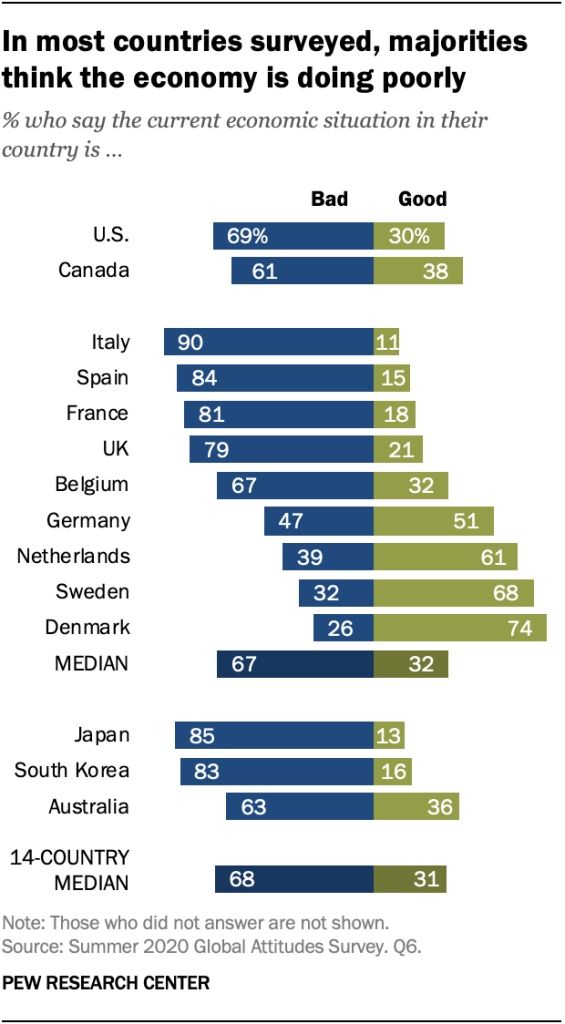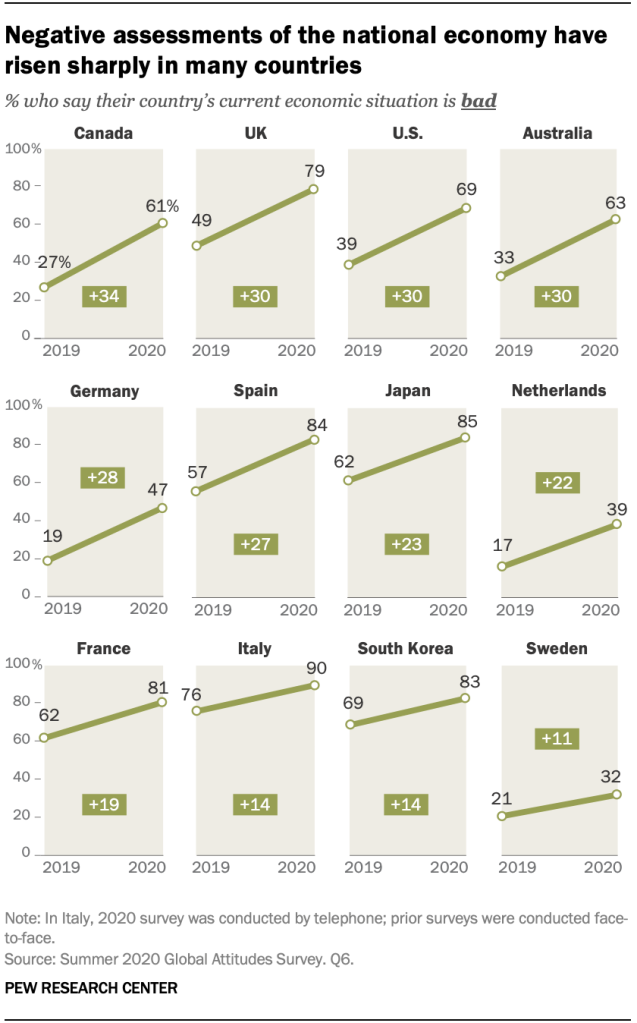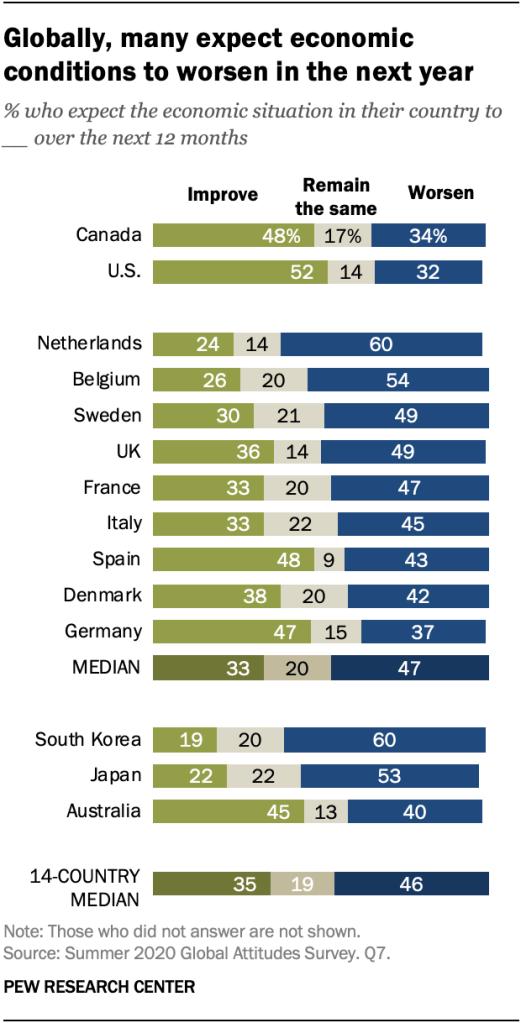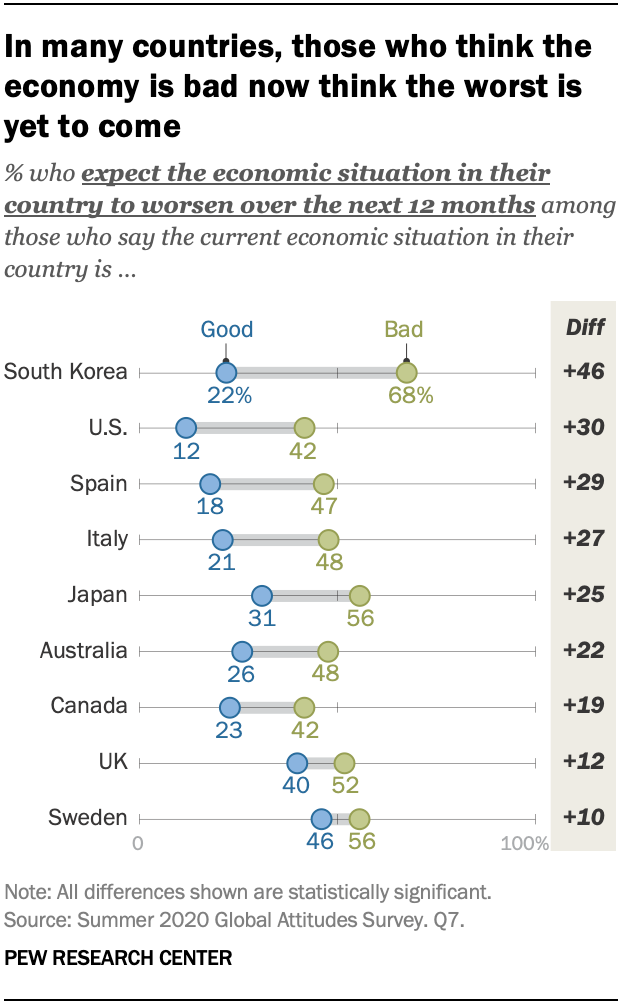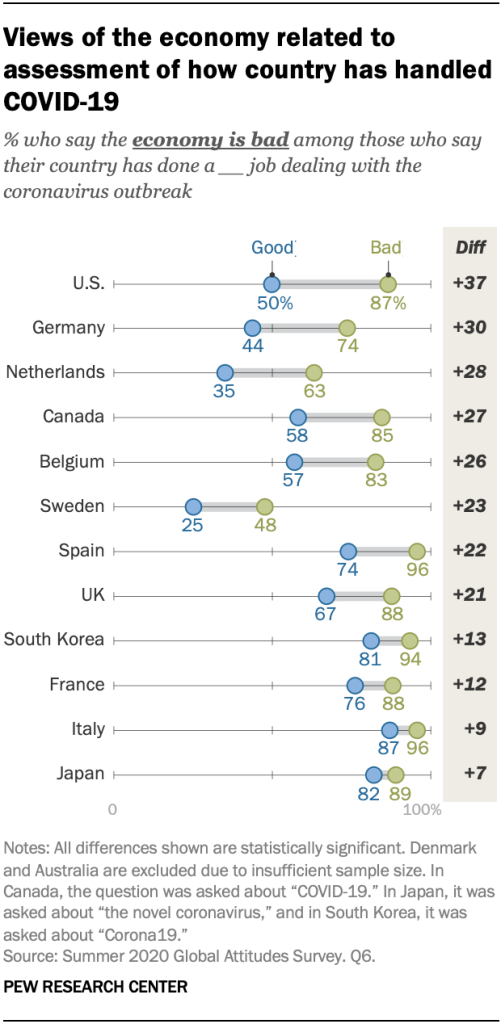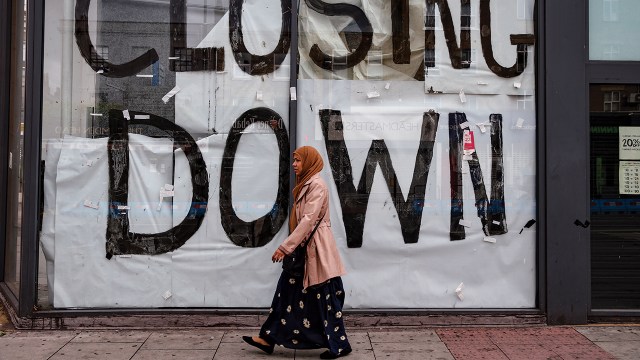
Public attitudes about the economy have turned bleak in much of the world as the coronavirus outbreak continues to affect daily life, according to a Pew Research Center survey conducted this summer in 14 nations in Europe, North America and the Asia-Pacific region. Assessments of national economies have seen swift downturns in many countries, and few see improvements anytime soon amid what the International Monetary Fund calls a “crisis like no other.”
Overall, a median of only 31% of adults across the surveyed nations assess their country’s current economic situation as good, while 68% say conditions are bad.
In 10 of the countries surveyed – including all of those surveyed in North America and the Asia-Pacific region – majorities consider the current economic situation bad.
In Europe, attitudes are mixed. Generally, Northern Europeans surveyed have more positive assessments, with a majority of Danes, Swedes and Dutch rating their country’s economic condition positively. Germans are split (51% good, 47% bad). In the rest of the European countries surveyed – Belgium, the UK, France, Spain and Italy – large majorities rate economic conditions negatively.
This analysis focuses on how people around the world assess economic conditions in their country amid the coronavirus outbreak. Though Pew Research Center has published extensively on Americans’ economic attitudes during the coronavirus outbreak over the past months, this survey is the first to examine more than just the U.S. experience. This study was conducted in countries where nationally representative telephone surveys are feasible. Due to the coronavirus outbreak, face-to-face interviewing is not currently possible in many parts of the world.
For this report, we use data from nationally representative surveys of 14,276 adults from June 10 to Aug. 3, 2020, in 14 advanced economies. All surveys were conducted over the phone with adults in the U.S., Canada, Belgium, Denmark, France, Germany, Italy, the Netherlands, Spain, Sweden, the UK, Australia, Japan and South Korea.
Here are the questions used for this report, along with responses, and the survey methodology.
Twelve of the 14 countries in the new survey were also surveyed in 2019, and in all 12, the share of adults who think their country’s current economic situation is bad has risen by double digits.
The sharpest uptick in negative assessments has come in Canada, where second-quarter losses in gross domestic product were estimated at 12%. The share of Canadians who say the country’s current economic situation is bad has roughly doubled, from 27% in 2019 to 61% this year. Negative assessments have also grown by 30 percentage points in the UK, U.S., and Australia.
Sweden, which has not imposed strict shutdown measures during the COVID-19 outbreak, saw the smallest increase in negative assessments of the economy. But even there, GDP is expected to contract by roughly 5% in 2020, and Swedes are 11 percentage points more likely to think economic conditions in their country are poor than in 2019.
In addition to the broadly negative assessments of current economic conditions, few in the countries surveyed are hopeful things will get better in the next year. A median of 35% think the economic situation in their country will improve in the next 12 months, while nearly half (46%) expect conditions to worsen and 19% think nothing will change.
Majorities or pluralities in eight of the countries surveyed expect their national economies to decline further. This includes people in countries such as the UK, France, Italy, Japan and South Korea. By contrast, people in the U.S., Canada and Germany are more likely to say the economy will improve over the next 12 months than to say it will worsen.
In many of the countries surveyed, those who say their country’s current economy is in bad shape are more likely than those who say the economy is doing well to believe that the economy will worsen in the next 12 months. In South Korea, for example, 68% of those who say the current economy is bad also say they expect it to get worse in the coming year, compared with just 22% among those who say the current economy is good.
In almost every country included in the survey, public perceptions of whether the national economy is bad are related to assessments of how the country has handled the coronavirus outbreak. Those who view their country’s coronavirus response negatively are more likely to describe their country’s current economic situation as bad.
This is particularly apparent in the U.S. Among Americans who say their country has responded poorly to COVID-19, 87% say the economy is bad, compared with half among those who say the response went well – a 37 percentage point difference. In Italy and Japan, this difference is less stark.
In roughly half of the countries surveyed, a similar pattern exists when it comes to assessments of the future economic situation. For example, Belgians who negatively evaluate their country’s handling of COVID-19 are 23 points more likely than compatriots who approve of the government response to say their economy will worsen over the next 12 months.
Only in Canada and Australia are people with lower incomes more likely than those with higher incomes to rate the current economic situation as bad.
In the U.S., Denmark, Spain, Australia and Japan, men are more likely than women to rate the state of the economy positively, and in Germany, Sweden, Japan and South Korea, men are also more optimistic about the economy improving.
In the U.S., 82% of those ages 18 to 29 say the current economic situation is bad, compared with 58% of those ages 50 and older. Younger Americans are also less likely than their older counterparts to expect improvements in the economic situation. In the Netherlands and South Korea, the opposite is true: Older people are more likely than younger people to say the current economic situation is bad. Younger South Koreans are generally more optimistic about a rebound than their older counterparts.
Note: Here are the questions used for this report, along with responses, and the survey methodology.
